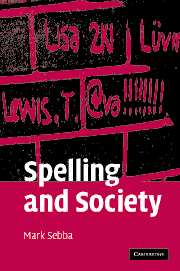Book contents
- Frontmatter
- Contents
- Illustrations
- Maps
- Diagrams
- Tables
- Acknowledgements
- Note on transcription
- 1 Map showing location of languages in Europe mentioned in this book
- 2 Map showing location of languages outside Europe mentioned in this book
- Introduction: society and orthography
- 1 Approaching orthography
- 2 Orthography as social practice
- 3 Language contact, linguists and the emergence of orthographies
- 4 ‘Postcolonial’ Orthographies
- 5 Between language and dialect: orthography in unstandardised and standardising vernaculars
- 6 Reform or revolution: where angels fear to tread
- 7 Why do we spell?
- Glossary
- References
- General index
- Index of language names
- Index of surnames
Introduction: society and orthography
Published online by Cambridge University Press: 22 September 2009
- Frontmatter
- Contents
- Illustrations
- Maps
- Diagrams
- Tables
- Acknowledgements
- Note on transcription
- 1 Map showing location of languages in Europe mentioned in this book
- 2 Map showing location of languages outside Europe mentioned in this book
- Introduction: society and orthography
- 1 Approaching orthography
- 2 Orthography as social practice
- 3 Language contact, linguists and the emergence of orthographies
- 4 ‘Postcolonial’ Orthographies
- 5 Between language and dialect: orthography in unstandardised and standardising vernaculars
- 6 Reform or revolution: where angels fear to tread
- 7 Why do we spell?
- Glossary
- References
- General index
- Index of language names
- Index of surnames
Summary
Some questions about spelling
On a suburban bus shelter in Lancaster during 1997 the following graffiti could be seen (Figure 0.1):
The names CHRIS and KRIS are among the most prominent written there. Chris is the standard short form of a very common English name, either male or female. Kris, on the other hand, is unusual in England. It is not a usual spelling of the name Chris nor is it a distinct name in its own right. Passing this spot on a daily basis and seeing these names together, I would speculate: Who, or rather, why, is Kris? Are Chris and Kris the same person, or are they two people, both called Chris, who differentiate themselves by one of them adopting an idiosyncratic spelling for his/her name? Whatever the answer, there is an interesting issue: Kris, being a highly unconventional spelling, is much more striking than Chris. Both sets of letters represent the same sounds, approximately [khɹis], and apparently represent the same word, the name Chris; nevertheless, these representations are not equivalent. There is some symbolism that attaches itself to Kris but not to Chris; the K is significant, it is ‘other’. As it happens, in this book, we shall come across many examples of a symbolic significance attaching to this particular letter. So the first of many orthographic questions which this book will ask is this: how can we give an account for the apparently intentionally ‘deviant’ or unconventional spelling of this person's name?
- Type
- Chapter
- Information
- Spelling and SocietyThe Culture and Politics of Orthography around the World, pp. 1 - 9Publisher: Cambridge University PressPrint publication year: 2007



